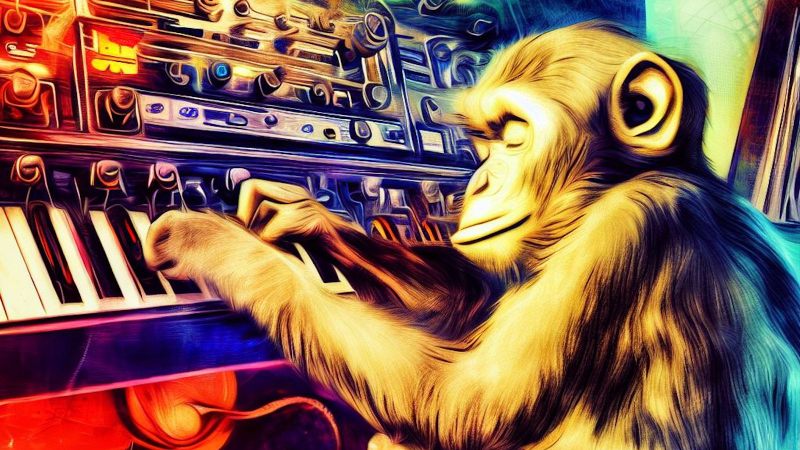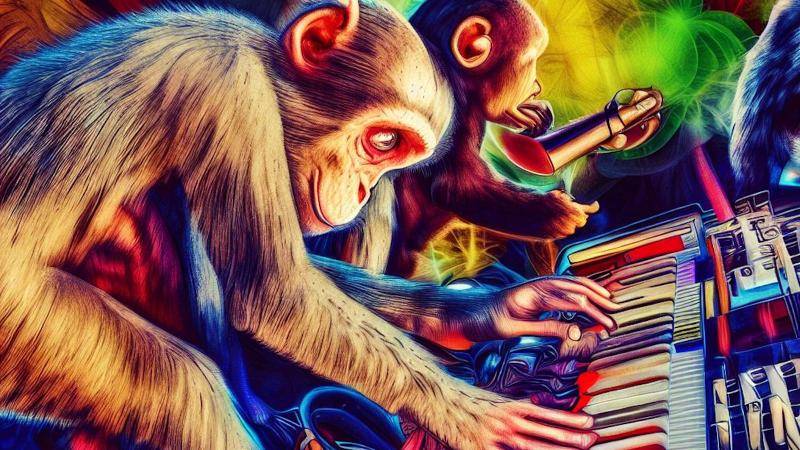The realm of music has always celebrated innovation. Now, with the advent of the AI music composer, the modern artist has a new tool to play with – and it's transforming the way we approach music creation.

Breaking Down the Marvel of AI Music Composition
The term AI music composer might conjure images of robots playing instruments or computers replacing human musicians. However, the reality is much more sophisticated and collaborative.
Delving into this technology reveals a intersection of data science, music theory, and human creativity.
Grounded in Music Theory
An AI music composer isn't some avant-garde tech toy detached from the fundamentals of music.
At its very core lies an in-depth understanding of music theory. These systems are educated on scales, chords, progressions, and structures.
Therefore, when they craft a melody or rhythm, it's not a random assortment of notes, but a well-thought-out composition grounded in the rules and nuances of musical language.
Algorithms: The Brain Behind the Operation
Algorithms act as the nerve center of an AI music composer. At a fundamental level, these are sets of rules and calculations that a computer follows.
But in the context of music, they are so much more:
- Pattern Recognition: By analyzing thousands of tracks, algorithms identify recurring patterns – the chord progressions often used in ballads, the beats typical to hip-hop, or the scales predominant in classical pieces.
- Predictive Analysis: Using historical data, algorithms can predict which note, chord, or rhythm might come next. It's like a seasoned musician intuitively knowing the next chord in a progression.
- Dynamic Learning: Modern audio AI tools use machine learning, which means they continuously evolve. With each song they analyze or create, they refine their understanding, making their suggestions more nuanced over time.
Databases: The Treasure Trove of Musical Data
While algorithms are the brains, databases are the heart. These extensive repositories store every piece of musical data the AI interacts with:
- Genre Libraries: From blues to techno, the database houses tracks from varied genres, providing the AI a holistic view of global music.
- Cultural Soundscapes: Beyond genres, these libraries also capture cultural nuances – the intricacies of African drums, the serenity of Asian flutes, or the passion of Latin guitars.
- Historical Progression: The databases often chronicle the evolution of music, allowing the AI to understand how rock-n-roll of the '60s differs from that of the 2000s or how classical compositions have transformed over centuries.
Top 5 AI Music Composers Making Waves
In the frontier of AI-assisted music creation, a few standouts have rapidly gained recognition.
Let's delve into these avant-garde platforms that are reshaping the soundscape of music production.
1. Empress Song Idea Generator
The creative process in music often begins with a spark or a theme that resonates deep within the artist. However, translating that raw feeling into a song can sometimes be a daunting task. Enter the Empress Song Idea Generator, a tool designed to bridge the gap between sentiment and sound.
This innovative feature within the Empress suite serves as a musical muse. It takes a chosen Theme/Emotion as its primary input and begins the process of generating song ideas that are harmoniously aligned with that sentiment.
Whether you're grappling with intense feelings of "Depression" or riding the waves of "Euphoria," this tool has the capacity to translate those emotions into compelling song concepts.
Imagine wanting to pen down a track that delves into the profound depths of "Loneliness." Inputting this emotion into the Song Idea Generator might produce haunting melodies, introspective chord progressions, and rhythms that evoke solitude.
On the flip side, should you choose "Triumph," the tool could suggest majestic orchestrations, uplifting harmonies, and rhythms that pulsate with victory.
2.Magenta by Google
Born in 2016 from Google's forays into the artistry of machine learning, Magenta is an open-source revelation. At its essence, it's a platform that stands at the intersection of technology and art, serving tools and models that empower artists and musicians to experiment with machine learning.
With offerings like Magenta Studio and Magenta.js library, the platform enables artists to give birth to path-breaking projects.
Central to Magenta's prowess is a neural network that drinks deep from a vast dataset of music and art, assimilating patterns and structures. With this enriched understanding, it's equipped to generate compositions that are not only unique but entirely unheard of.
Musicians have wielded Magenta to craft innovative compositions and amplify live performances. Beyond the realm of music, its touch extends to the creation of evocative art, be it in the form of imagery, videos, or cinematic productions.
3. Soundful
Soundful stands as a testament to the democratization of music creation. It's an AI Music Generator designed with the singular aim of empowering content creators and artists. With Soundful, even the uninitiated can birth high-quality tracks, sidestepping the technical intricacies that traditionally marked the process.
The platform prides itself on its mission to democratize music creation and distribution. Catering to varied users, Soundful offers a bevy of features, from genre selection to intricate customizations.
Beyond creation, it also opens the doors to monetization, enabling creators to cast their compositions onto leading streaming platforms or license them for films, advertisements, and more.
Its user base ranges from budding enthusiasts to seasoned professionals, all drawn by the platform's promise of a simplified, yet high-quality, music creation and distribution process.
4. Amper Music
Amper Music breaks down the walls of complexity that often surround music creation. It’s an AI tool designed for the digital age – simple, fast, and cloud-based. Tailored for marketers, businesses, and podcasters, it promises quick compositions without any fuss.
Features like rapid music composition make it a favorite among users looking to create soundtracks for various media. With its cloud-based architecture, all creations are stored safely on the platform, ensuring accessibility at all times. The interface is brimming with a plethora of musical instruments, enabling the AI to dabble in diverse styles. Additionally, a vast collection of musical samples facilitates rapid genre creation, leveraging existing templates and models.
5. Jukedeck
Sharing a similar vein with Amper in its foundational technology, Jukedeck harnesses neural networks to study music data. But where it carves its niche is in its unique offerings. The platform is a playground, allowing users to customize tracks in terms of tempo, duration, and more. This grants creators a level of granularity in tailoring compositions to their precise needs.
Jukedeck stands out for granting complete creative control to its AI composer. This democratization allows for the creation of awe-inspiring tracks that are free, yet unparalleled in quality. For those keen on acquiring a license, Jukedeck’s flexible pricing model ensures affordability while ensuring access to top-tier compositions.

Dive into Empress: More Than Just a Tool
Empress is not merely an algorithm or software; it's a partner in every musician's creative journey.
It offers the perfect balance between the latest audio production technology and human creativity.
Whether you're trying to find the right chord progression, searching for the lyrics that encapsulate your thoughts, or need assistance in the nitty-gritty of marketing your music, Empress stands out as the answer.
1. Melody Mind
The Melody Mind tool is an innovative AI melody generator. It's as simple as inputting your chosen instrument, setting your preferred chords, selecting a genre, and specifying the beats per minute (bpm).
For instance, envision inputting an acoustic guitar, with chords that hint at nostalgia, in an indie folk genre, at a relaxed 70 bpm. The output? A tune that might remind you of an evening under the stars.
2.Lyric Lab
With Lyric Lab, you can create lyrics that resonate. As an AI lyrics generator, it requires you to specify the genre – be it "Futuristic Sci-Fi" or any other, and then set the tone or style, like "ominous".
Imagine crafting a song set in a post-apocalyptic future. With the inputs mentioned, you might end up with lyrics hinting at a world of high-tech ruins and a sky shrouded in mystery.
3. Chord Candy
The Chord Candy is the go-to AI chord generator. Insert in the instrument, choose your key, identify the genre, and set the bpm.
Let's say you choose a piano, in the key of C major, in a jazz genre, at a sultry 90 bpm. The result? Smooth transitions and jazzy rhythms that transport you to a smoky lounge.
4. Bass Brain
Taking care of the lower frequencies, Bass Brain is dedicated to generating bass lines. Input the type of bass you're working with, decide on the chords, pick the genre, and specify the bpm.
For instance, picking an electric bass, with funk chords, in an upbeat disco genre, at 120 bpm might get you a groovy bass line reminiscent of the dance floors from the '80s.
5. Drums De Dior
Rhythm is the heartbeat of any track. With Drums De Dior, you can craft a drum beat that sets the pace. Choose your genre and bpm, and let the tool do its magic.
Picturing an electro-pop genre at 130 bpm? You'll get a beat that gets the crowd moving, echoing the latest chart-toppers.
6. Harmonious Hitmaker
Ever dreamed of turning your song title into a sensation? The Harmonious Hitmaker takes your inputs on emotion and genre to give your tracks a touch of stardom.
If you're aiming for an emotion of "euphoria" in a "pop" genre, for instance, the tool might craft hooks and sections that would fit right into a summer playlist, resonating with audiences worldwide.

Why Wait? Unleash Your Creativity with Empress
Music is an ever-evolving field, and tools like Empress ensure you're always ahead of the curve. Whether you're a seasoned musician or someone dipping their toes in the vast ocean of audio, Empress offers the resources, guidance, and inspiration you need. Dive in, explore, and let your creativity soar!
FAQs: AI Music Composer
Q1: How user-friendly are these AI music composers?
Designed with users in mind, most platforms, especially Empress, prioritize intuitive interfaces.
Q2: Do I need a background in music to use Empress?
No, Empress caters to both professionals and novices.
Q3: Is AI-generated music royalty-free?
It varies by platform, but Empress provides clear guidelines on usage.
Q4: Can I customize AI-generated music on Empress?
Absolutely! Empress offers a foundation, which you can then modify to fit your vision.
Q5: How do Empress's marketing tools assist musicians?
From SEO optimization to crafting engaging captions, Empress ensures your music reaches its desired audience.
Follow the future of music with Empress. Check out our blog to learn how you can effectively use these AI music tools.


